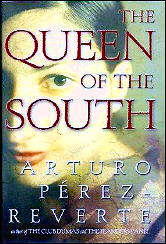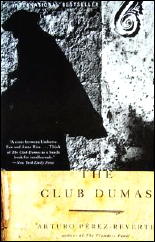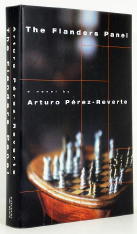Fri 11 Sep 2009
A Review by David L. Vineyard: ARTURO PEREZ-REVERTE – Queen of the South.
Posted by Steve under ReviewsNo Comments
ARTURO PEREZ-REVERTE – Queen of the South. First US edition: Putnam, hardcover, June 2004; trade paperback: Plume, May 2005.

So opens Arturo P?rez-Reverte’s Queen of the South, “the corrido to Teresa Mendoza,” the most accessible novel by the Spanish author of bestselling intellectual thrillers like The Club Dumas and The Seville Communion. This epic tale is the story of Teresa, who goes from the girlfriend of drug smuggling pilot Guero Davila in Culiacan, Mexico to the drug queen of the Costa del Sol in Spain in twelve busy years.
Queen of the South is P?rez-Reverte’s paean to his favorite writer Alexandre Dumas’ The Count of Monte Cristo, and indeed the classic plays a major role in both the novel and Teresa’s life. She is the modern Edmund Dantes, who is reborn as a mysterious figure of mystery and revenge.
But first she has to survive, and that is no easy job in the violent drug haunted world of the drug runners and narcocorridos who sing about them. Pursued by a pair of hitmen, Teresa flees for her life, and in due time she finds herself in Morocco working as a whore.

There she falls for another handsome drug runner, this one using fast cigarette boats to smuggle drugs into Spain. When they are captured, Teresa ends up in prison. And there she meets the tough smart lesbian Patti, who befriends her and gives her a copy of The Count of Monte Cristo to read.
For Teresa, the novel is a revelation, and an inspiration. Perez-Reverte is reminding us that books are powerful and matter. When Teresa emerges from prison with Patti, she puts her plans into motion, and soon she is controlling the drug traffic along the entire Costa del Sol, the Spanish Riviera.
She spares the life of one of the Mexican hitmen sent to kill her, and wins a friend and ally, her right hand man. She outwits the law and outmaneuvers her competition, becoming a legend.
And in due time she returns to Culiacan for her stunning revenge.
The novel is told in part as P?rez-Reverte’s investigation into Teresa’s life, alternating with third person accounts of her adventures. The style is clean and poetic in the Chandler mode, if the story itself is the stuff of Harold Robbins’ The Adventurers.
Combining the swashbuckling of Dumas, the seriousness of Graham Greene, the style of Chandler, and the glamour of Sidney Sheldon or Harold Robbins, Queen of the South is as satisfying as the best pulp in the Godfather style, and yet it is a serious and well written novel as well.
P?rez-Reverte made his debut with The Flanders Panel, and since has cemented his place as one of the best writers of the intellectual thriller, with one stunning book after another — The Club Dumas, The Seville Communion, The Fencing Master, The Nautical Chart, Painter of Battles, and the series of historical swashbucklers about Captain Alariste, a 16th century Spanish swordsman and mercenary that have swept Europe and are currently being prepared to reach the big screen.

P?rez-Reverte obviously has fallen a little in love with Teresa, and you may well yourself. It is a stunning read, exciting, smart, compellingly readable, and poetic, in its own way a narcocorrido and a commentary on the society that makes heroes of violent drug smugglers whose violence spills over into the innocent streets.
Queen of the South itself is a sort of song of Teresa Mendoza, a portrait of a remarkable woman who spends twelve years and builds an empire only to risk it all it avenge the man she once loved.
Note: There always have been intellectual thrillers, but since the stunning success of Umberto Eco’s The Name of the Rose, the genre has become an important addenda to the thriller genre.
Arturo P?rez-Reverte is one of several Spanish writers who found new freedom in the era following the end of Generalismo Franco’s reign and lifted Spanish popular literature to bestselling status. Of those writers, P?rez-Reverte is the best, both serious and playful, compulsively readable, and a man with something to say.